During a recent game night at my place, we played a lot of my old-time party favorites, such as UNO and Just One. But before we got too far down the road, I made sure to break out Wavelength (2019, CMYK), my favorite party game of all time.
Wavelength is the game in the wildly colorful box you might have seen at a friend’s house, your local Target, or maybe through the game’s app, which is a standalone product that can be found in the App Store or Google Play. First, two teams are split as evenly as possible. On a turn, one player from the active team is named the Psychic for that round and has to select a scale from a card in the draw deck. Scales could be spectrums as simple as Hot/Cold, or something more challenging, like Better as a Book/Better as a Movie. There are dozens of double-sided cards included in the box, each with two terms used to define a spectrum of ideas.
The Psychic’s job is to give their team a clue that aligns with a randomly-spun result on a wheel showing points. The Psychic spins the wheel, looks at the result, shuts a cover that hides the result, then comes up with a clue that will hopefully give their team a chance to select a position on the wheel that comes close to the result of the clue.
For example, let’s say the result that the Psychic is working with is maybe a third of the way from the left-hand side of the scale. The Psychic draws a card: 80s/90s. This would put 80s on the left side of the spectrum and 90s on the right.
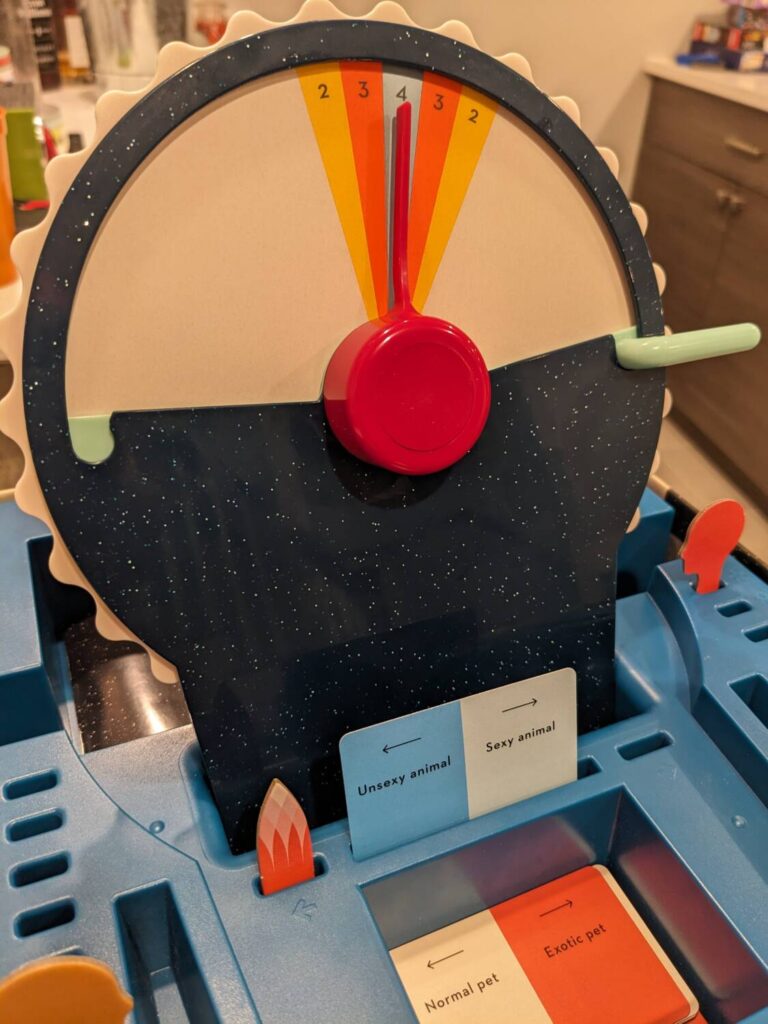
Thinking of a clue that might steer the team towards 80s, but not all the way to something very early in the 80s, the Psychic might go with Ronald Reagan. Reagan was definitely the President of the United States during the majority of the 1980s, and he wasn’t in office in the 1990s. But given the time in office, maybe this would point players to pick a spot in the middle of the 80s half of the wheel. (Other clue ideas abound. How about a clue like “the birth year of most of my friends”? The height of the AIDS epidemic? The best albums by pop artist Prince?)
Another example: Action Movies/Adventure Movies. If I gave a clue such as Raiders of the Lost Ark, where would that land on the spectrum? If the Psychic wanted the group to land somewhere in the middle of the scale, this clue might work well. But would it still work as well if the random spin had the scoring range tilted almost all the way to the right, towards Adventure Movies?
The active team (minus the Psychic, who might leave the room or turn around, to avoid spoiling their thoughts on what the team is discussing at the moment) then get a couple minutes to select a spot on the range. The opposing, inactive team then has a binary decision to make: will the Psychic’s scoring range fall more to the right or left of what the active team chose as their final guess?
Then, the big reveal—the scoring spectrum shutter is opened. The scoring range is a small pie that ranges from 2-4 points. If the active team had their pointer in that range, they score that value. If the inactive team correctly guessed where the scoring midpoint might end up, they can also earn a point. Turns go back and forth until one team scores 10 points, with the team currently behind able to take back-to-back turns if they guess a Psychic’s clue and score in the four-point range on their turn.
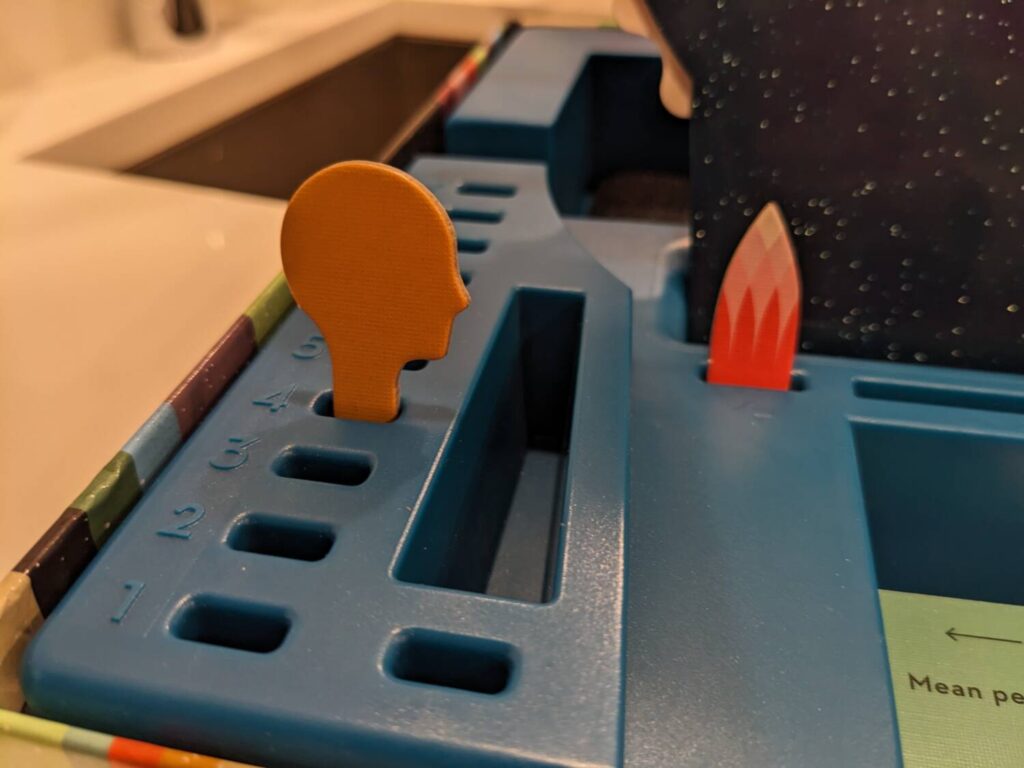
It Always Works
Wavelength is my go-to for a lot of reasons, but one more than any other: it accommodates all player counts. You could play it at two (although I never have) or you could play it with 20. It’s interesting as a couples date night game, in part to stretch its muscles as an alternative to The Dating Game from a thousand years ago—if you know your partner really well, couples can do pretty well in a game of Wavelength.
I usually play Wavelength with 8-10 people. Because of the team format, losing a person at points during the game doesn’t hurt. During this most recent play, my team of five included my wife and 10-year-old child along with two friends. At one point, my wife left for a couple rounds to put my younger child to bed. By the end, the 10-year-old had gone to bed, so we just kept taking turns with whichever warm bodies were standing near the living room where we played.
The rules can be taught in under a minute. Even when games run long, you are talking about 45 minutes; usually, a game of Wavelength is over in half that time, maybe less. It’s a fantastic game to play with people who know each other intimately, but there’s just as much fun to be had when people are complete strangers and have to go with more generic clues because the Psychic doesn’t know how many references they can use in their clues to get everyone to understand their intent.
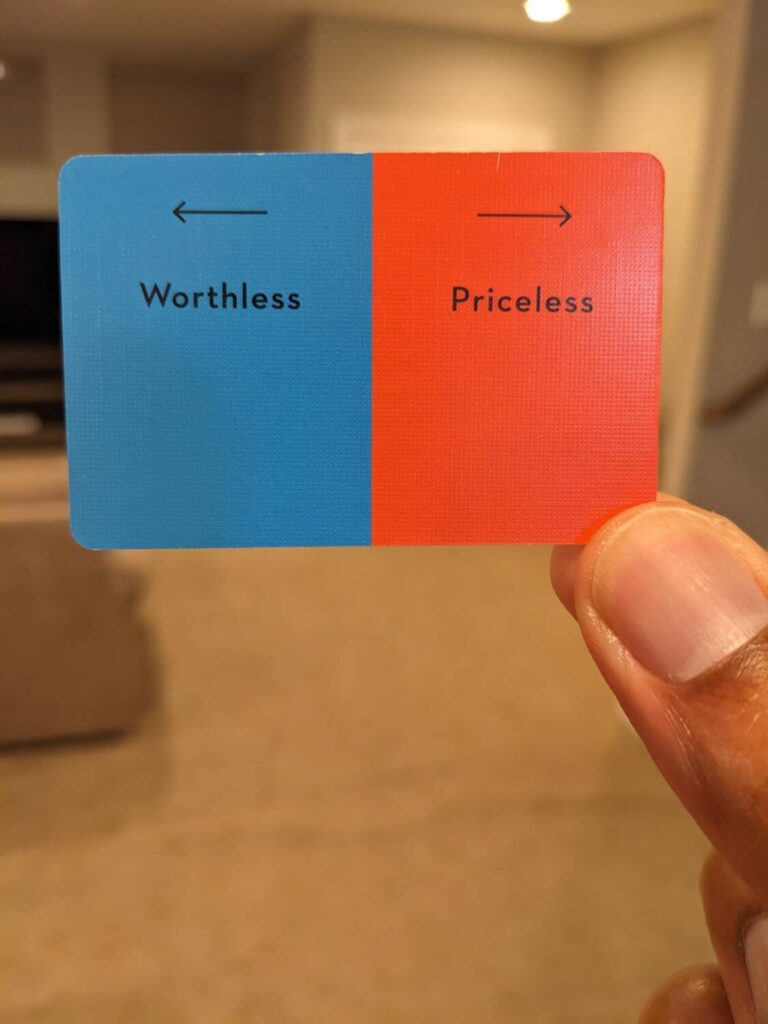
There are so many clue cards in the Wavelength deck that I’m sure I still haven’t seen half of them, five years after picking up my copy of the game and playing it 20 or 30 times. Every Wavelength play has a few big moments, where a team just missed a four-point score (a perfect turn), or when someone gave a clue that threw everyone on their team off the scent (this is bad). Because of the scoring format, both teams are paying attention on every turn, in the hopes that they can score the single point that comes from guessing left or right as the inactive team.
I love being the Psychic just as much as I love debating the spot on the spectrum where a different Psychic’s clue will ultimately land. The debate is the juice in Wavelength and I’m not surprised that this element has not gotten old.
I love how the production allows for the big wheel to be held upright by part of the game’s insert. Everything you need is sorted and ready to go in about 30 seconds. It’s a bigger box, so it doesn’t travel as well as other party games, but since I only ever play it with friends who each have their own copy at our respective homes, that issue hasn’t surfaced so far.
Wavelength and Just One are typically my one-two punch for a casual game session and everyone finishes the night a winner. Wavelength will never leave my collection, and I hope this convinces some of you that you need to own a copy too!


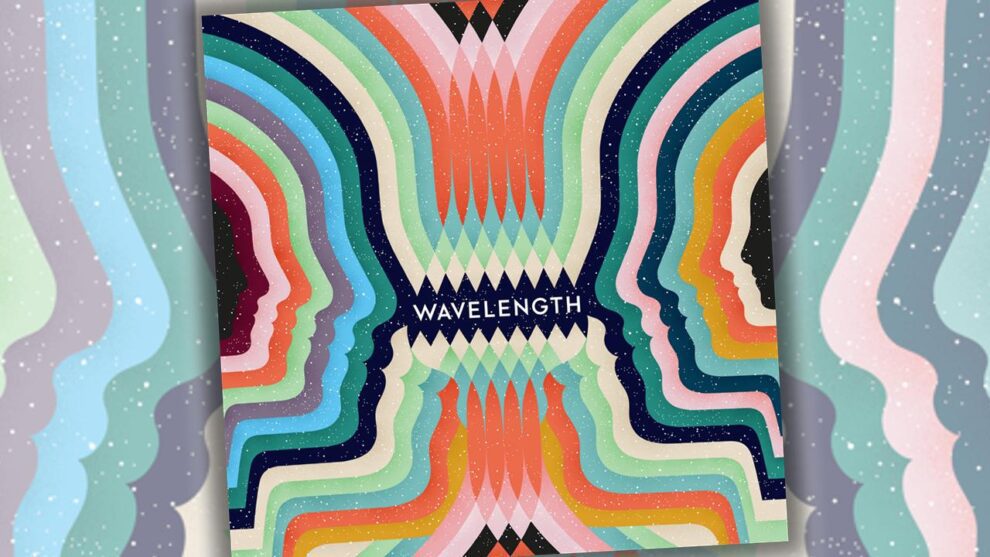

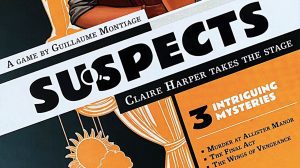

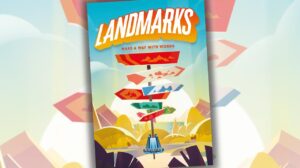
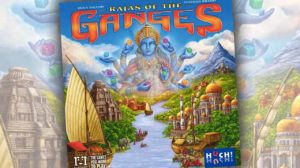




Add Comment